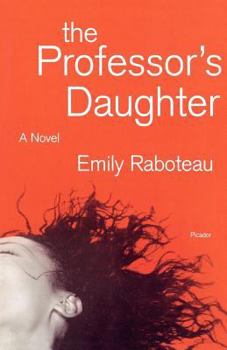The Professor's Daughter
Select Format
Select Condition 
Book Overview
"My father is black and my mother is white and my brother is a vegetable." When Emma Boudreaux's older brother winds up in a coma after a freak accident, she loses her compass: only Bernie was able to navigate--if not always diplomatically--the terrain of their biracial identity. And although her father and brother are bound by a haunting past that Emma slowly uncovers, she sees that she might just escape.
In exhilarating prose, The Professor's Daughter traces the borderlands of race and family, contested territory that gives rise to rage, confusion, madness, and invisibility. This astonishingly original voice surges with energy and purpose.Customer Reviews
Rated 5 starsRaboteau's prose effectively gripping
There's too much to say about this novel, so I shall leave it to a few short comments: Raboteau's advance stylistic techniques are a pleasure to read. Her fragmented chronological order is quite Tarantinoesque. You find yourself in a love/hate relationship with each of the characters, and the supreme irony is poetic yet unsettling. 5 stars. It doesn't get much better.
0Report
Rated 5 starsFabulous read
I found this book riveting, from the first page to the last. Ms. Raboteau's writing is deft, assured, and daring. I was transported throughout the reading and willingly went anywhere the prose took me--and it took me many places (from a train wreck to a lynching to a boarding school to Ethiopia to the bedside of a formerly vital loved one who has become a "vegetable" to a flying dream state and more). Really, the writing just...
0Report
Rated 5 starsMagically Poetic....
The Professor's Daughter is Emma Boudreaux, a young woman who is struggling with the loss of her older "spiritual twin" brother, Bernie (Bernard Boudreaux III), who dies after a brief coma following a freak accident. Emma has long been a victim of physical and emotional abandonment from her father, the world renowned Yale professor, Bernard Boudreaux II, but her brother's death seems to exacerbate her "condition" and pushes...
0Report
Rated 5 starsGood Candidate for Book of the Year
Emily Raboteau wrote a good story in Callaloo that I remember being sort of the same storyline as this, three of four years ago, and at the time I wrote down her name as a writer to watch out for. Here we get the whole nine yards. The novel has a sort of Willa Cather flavor to its title (remember THE PROFESSOR'S HOUSE?), and Raboteau's combination of delicacy and broad strokes do call to mind a young Willa Cather. But other...
0Report
Rated 5 starsA glittering debut
A glittering debut from a young author who is definitely going places. Raboteau molds her characters with a delicate, cunning hand. I had the sense that she took great care in polishing the book because the story seemed to flow effortlessly, almost as if Emma, Bernie, and others were propelling themselves. Raboteau's skill is most striking in small descriptions, in details, where her style is poignant, sometimes disarmingly...
0Report













